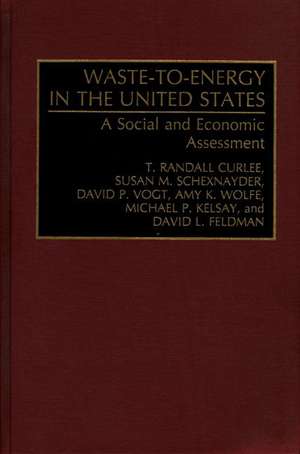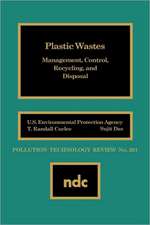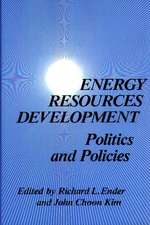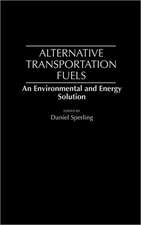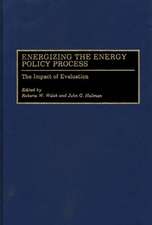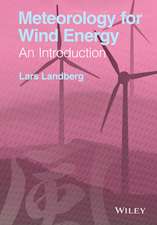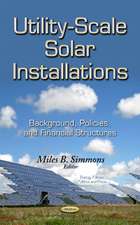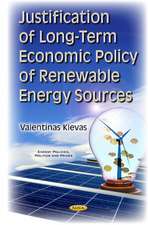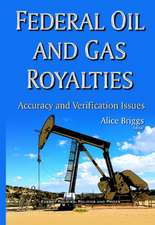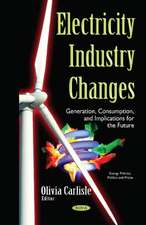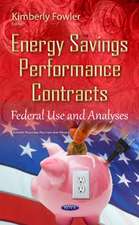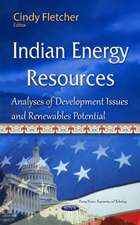Waste-To-Energy in the United States: A Social and Economic Assessment
en Limba Engleză Hardback – 25 ian 1994 – vârsta până la 17 ani
Preț: 438.76 lei
Preț vechi: 708.31 lei
-38% Nou
Puncte Express: 658
Preț estimativ în valută:
83.96€ • 87.88$ • 69.88£
83.96€ • 87.88$ • 69.88£
Carte tipărită la comandă
Livrare economică 31 martie-14 aprilie
Preluare comenzi: 021 569.72.76
Specificații
ISBN-13: 9780899308449
ISBN-10: 0899308449
Pagini: 280
Dimensiuni: 156 x 235 x 18 mm
Greutate: 0.57 kg
Ediția:New.
Editura: Bloomsbury Publishing
Colecția Praeger
Locul publicării:New York, United States
ISBN-10: 0899308449
Pagini: 280
Dimensiuni: 156 x 235 x 18 mm
Greutate: 0.57 kg
Ediția:New.
Editura: Bloomsbury Publishing
Colecția Praeger
Locul publicării:New York, United States
Notă biografică
T. RANDALL CURLEE is an economist and Head of the Energy and Global Change Anaysis Section in the Energy Division of Oak Ridge National Laboratory. In addition to Congressional testimony and serving on several national advisory panels on the topic of municipal waste management, Dr. Curlee is widely published in various areas of waste management and resource allocation. He has also contributed several chapters to books on the subject of waste management and is the author of The Economic Feasibility of Recycling: A Case Study of Plastic Waste (Praeger, 1986).SUSAN M. SCHEXNAYDER, an anthropologist, is a research associate of the University of Tennessee's Energy, Environment, and Resource Center subcontracted to Oak Ridge National Laboratory's Energy Division. Ms. Schexnayder has extensive interviewing and social impact assessment experience. She has examined community preferences at Superfund sites for the U.S. EPA, conducted social and cultural resource impact assessments for environmental impact statements for several federal agencies, and produced socio-demographic portions for U.S. Department of Energy safety analysis reports.DAVID P. VOGT is an economist in the Energy and Economic Analysis Section of Oak Ridge National Laboratory. His research interests are in the development of analysis tools that focus on providing a consistent national and regional perspective of the potential impacts of alternative policy choices. Much of his work has addressed the potential constraints on regional development and/or adverse impacts due to energy shortage or shifts in energy supply patterns. Dr. Vogt has developed several nationally recognized regional modeling systems for the U.S. Department of Energy, the Federal Emergency Management Agency, and the U.S. National Guard.AMY K. WOLFE, an anthropologist in Oak Ridge National Laboratory's Energy Division, specializes in decision making issues relating to technology and the environment as well as social impact assessment. Dr. Wolfe's publications--book chapters, journal articles, and technical reports--center on perceptions of technologies and their risks, risk communication, and methods for social impact assessment. Journals in which she published and served as guest editor or co-editor include The Environmental Professional and Practicing Anthropology.MICHAEL P. KELSAY is currently an Assistant Professor at Indiana-Purdue University at Fort Wayne in the School of Public and Environmental Affairs. Dr. Kelsay has an extensive background in the areas of municipal waste management and finance. While at the University of Tennessee's Energy, Environmental, and Resources Center in Knoxville, Tennessee, he worked on a variety of solid and hazardous waste projects for the State of Tennessee and U.S. EPA. Prior to going to the University of Tennessee, Dr. Kelsay was President and Chief Executive Officer of Argentine Savings and Loan in Kansas City, Kansas. He is the author of book chapters and other publications on waste management and tax policy, and has made numerous professional presentations on the financial aspects of waste management.DAVID L. FELDMAN is a political scientist and Senior Research Associate at the Energy, Environment, and Resources Center at the University of Tennessee, Knoxville. He also serves as Senior Editor of Forum for Applied Research and Public Policy. Dr. Feldman has led studies on the implications of SARA Title III for risk communication and public involvement in risk management and is widely published in the fields of waste management in the United States and Europe, global environmental policy, and water resources management. He is the author of Water Resources Management: In Search of an Environmental Ethic (1991).
Cuprins
IllustrationsForewordPrefaceIntroductionMunicipal Solid Waste and the Role of Waste-to-EnergyGeneral ApproachA Preview of Following ChaptersThe IssuesUncertainties about Potential Environmental and Health RisksLegislative and Regulatory UncertaintiesAn Overview of Waste-to-Energy in the United StatesWTE Industry Structure in the United StatesThe Potential for Energy Production from MSW CombustionWaste-to-Energy in the United States and Key Socioeconomic FactorsA Focus on Financial IssuesSome Background on the Cost of Environmental ManagementPotential Financing MechanismsThe Increasing Costs of WTE FacilitiesFederal Tax PolicyScratched and Abandoned FacilitiesSummary and Future OutlookCase Studies: Community Decision MakingBroward County, FloridaOakland County, MichiganKnox County, TennesseeMonmouth County, New JerseyThe Socioeconomics of Waste-to-Energy: ConclusionsAppendicesBibliography
